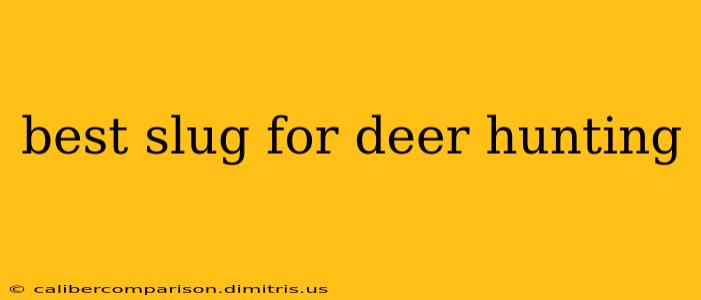Choosing the right slug for deer hunting is crucial for a successful and ethical hunt. The "best" slug depends heavily on your firearm, hunting style, and the specific hunting conditions. This guide dives deep into the factors influencing slug selection, helping you make an informed decision for a clean, humane harvest.
Understanding Slug Types and Their Performance
Several types of slugs are available, each with its own advantages and disadvantages:
1. Rifle Slugs:
- Full Bore Slugs: These slugs are the diameter of the barrel and often feature a rifled design or a sabot to enhance accuracy and reduce fouling. They are known for their long-range accuracy and high energy transfer. Popular choices include Foster slugs and Brenneke slugs.
- Sabot Slugs: These slugs utilize a plastic sabot that helps the slug stabilize as it travels down a smoothbore barrel. Once clear of the barrel, the sabot separates. This allows for exceptional accuracy, even from shotguns lacking rifled barrels. They’re generally favored for longer ranges.
2. Shotgun Slugs:
- Solid Slugs: These are single, solid projectiles designed for smoothbore barrels. They are less accurate at longer ranges compared to sabot or rifled slugs.
- Hollow Point Slugs: Designed to expand upon impact, increasing stopping power at close ranges. This expansion comes at the cost of potentially reduced range and accuracy.
Key Factors to Consider When Choosing a Slug
Several factors influence your choice of the best deer hunting slug:
1. Barrel Type:
- Rifled Barrel: Rifled barrels enhance accuracy, particularly with full-bore slugs or sabots. They offer superior long-range performance.
- Smoothbore Barrel: Smoothbore barrels are more versatile and can work with solid slugs, but generally offer less accuracy at longer distances. Sabot slugs are a good choice for smoothbores aiming for long-range accuracy.
2. Range:
- Close-Range Hunting: For close-range shots, a solid slug or hollow-point slug might suffice. The increased stopping power of these slugs is beneficial at shorter distances.
- Long-Range Hunting: For longer-range shots, rifle slugs or sabot slugs are necessary to ensure accuracy and sufficient energy transfer for a clean kill.
3. Accuracy:
- Accuracy Testing: Always test your chosen slug and firearm combination at various ranges to determine its accuracy before hunting. This is crucial for ethical and successful hunting.
- Shot Placement: Accuracy is paramount in deer hunting. A poorly placed shot can lead to a wounded animal, which is both unethical and illegal.
4. Energy Transfer:
- Stopping Power: A slug must have sufficient energy transfer to ensure a quick, humane kill. This is influenced by the slug's weight, design, and velocity.
5. Your Hunting Style:
- Still Hunting: If you prefer still hunting, long-range accuracy is key.
- Driving Deer: In driven hunts, you might need a slug with more immediate stopping power.
Choosing the Right Slug for Your Needs: A Practical Guide
- Smoothbore Shotgun with a focus on close to mid-range shots: A solid slug or a hollow-point slug might be suitable.
- Rifled Barrel Shotgun with a need for longer-range accuracy: A sabot slug or a rifled slug is the recommended choice. Focus on brands known for accuracy and consistency.
Remember: Always consult your firearm's manual for recommendations on suitable slug types and weights. Prioritize ethical hunting practices.
Conclusion: Responsible Slug Selection for Ethical Deer Hunting
Selecting the best slug for deer hunting involves carefully weighing several factors, from barrel type and range to desired accuracy and stopping power. Prioritizing ethical hunting practices through accurate shot placement and responsible slug selection ensures a humane and successful hunt. Always practice safe gun handling and adhere to all applicable hunting regulations.

